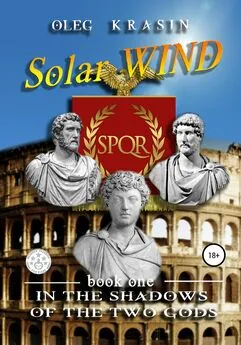Oleg Krasin - Solar Wind. Book one
- Название:Solar Wind. Book one
- Автор:
- Жанр:
- Издательство:неизвестно
- Год:2022
- ISBN:нет данных
- Рейтинг:
- Избранное:Добавить в избранное
-
Отзывы:
-
Ваша оценка:
Oleg Krasin - Solar Wind. Book one краткое содержание
MARCUS AURELIUS ANTONINUS
The emperor-philosopher, for a moment, thanks to him, the world was governed by the best and greatest man of his age.
Solar Wind. Book one - читать онлайн бесплатно ознакомительный отрывок
Интервал:
Закладка:
This was not the first time Marcus has read such coarse inscriptions coming from the depths of people's self-awareness. Of course, the simplicity of street humor was not in any comparison with the exquisite jokes of lawyers, philosophers or rhetoricians. She was closer to the Atellan farce and the mime, to the actors who played them, for example, to the well-known Marullus. Nevertheless, Marcus was never confused by the frank images inspired by Eros, crammed defiantly with huge phalluses.
He noticed that at the entrance to the houses on small chairs sat caretakers from retired military, in the past options 39 39 Option (Latin Optio) is a centurion assistant.
or decurions. 40 40 Decurion (Latin Decurio) is the leader of the ten-man cavalry unit in the Legion.
They collected rent for the owners, kept order. Usually these former fighters played with weighty sticks in their hands and looked unkindly at passers-by. But today they were disassembled by fun, and they did not look like sullen supervisors.
Noticing Marcus, one of these caretakers rose from his chair, and scornfully ignored the massive, clumsy Antiochus, who had warily stepped from behind the young patrician, saying, smiling:
“Dominus, does a woman want to.”
“Do prostitutes work during the day?” Marcus wondered, having heard about the experience of adult buddies.
“They always work, young dominus,” replied the caretaker, continuing to smile unpleasantly.
“Or maybe so I celebrate my new age?” returned to Marcus bold thoughts, which arose when he looked at the girls and women singing in the streets, at their pink cheeks and cheerful eyes, at their alluring bodies.
“We're going to the Libera sanctuary,” Antiochus interjected. In the cool air his voice sounded cracked, revealing a Greek accent. “The dominus doesn't have time now.”
“I think it will be up to the young master himself,” the caretaker said brazenly.
As he spoke, a mature, kind woman with fiery red-painted hair, a typical lupa, 41 41 Lupa (Latin) is a wolf, harlot
peeked out of the entrance of the insulae. Prostitutes were often painted in such defiantly bright colors, walked red or blue-headed.
“You have a place in the Lupanar,” Antiochus observed, “you violate the law of Augustus, which prohibits the accepting of customers at home.”
“What are you, the lictor? Something unnoticed by your fasces,” 42 42 Fasces is a bundle of bandaged bars, symbolizing official power.
echidna throws a woman, quickly looking around Marcus. “Augustus has long been a god, and the gods do not always descend to such little things. Oh, what a lovely boy! Come on, come on with me!” she invited Marcus.
But words were not limited. She grabbed it, and Marcus unwittingly noticed her old skin, dirty nails on her hands, felt the unpleasant smell of an unwashed body. He became disgusted, the desire to go did not arise, but the legs themselves obediently led after the woman on shabby wooden stairs, on the floors, at the ends of which there are large vats for sewage. Residents poured their excrement there every morning. This smell was disgusting, sickening, but Marcus, as if fascinated by something, went after the old prostitute. Behind puffed heavy Antiochus.
The woman, meanwhile, having received a client, and even such a sweet, clean boy, went a quick step and spoke loudly, she was in a good mood. It turned out that she was from Bithynia, from where was born Hadrian’s favorite Antinous. No, she didn't know Antinous, and in the town of Claudiopolis, where he was born, she was not, but she heard about him. Hadrian had raised many monuments to this unfortunate young man. Died in the color of years! What a grief for his mother!
She herself, and her name was Demetra, three boys and all attached—traded in the shops of their fathers. She tried for them, she collected a small capital, forced them to go to school. True, their teacher was strict, he beat them with a whip mercilessly for every fault. But they grew up obedient and attentive to her, to their mother, to the glory of the gods!
They didn't get to the top floor, where the prices for the rent weren't as big as the bottom. Demetra rented a room for two thousand sesterces a year. The situation in it, although not shone luxury, but seemed quite tolerable. Apparently, its owner enjoyed success with men, especially in his younger years.
In the corner was a large bed, which could fit a few adults, perhaps three or four. That's what Marcus thought. A couple of trunks set against the wall. The table on which there were two clay jugs, and a chair stood near the window. From there was a coolness—on the upper floors there was no glazing, there were only wooden shutters, out of shape from the damp and barely covered. They hardly let the daylight pass, and therefore the room was gloomy.
In such darkness it was difficult to see the drawings on the walls covered with ochre, but Marcus still considered the erotic scenes that Demetra ordered the artists tailored to her craft. On them men with huge phalluses, exceeding the size of their hands, copulating with women in various poses.
“Now, now, sweetheart!” Demetra said, deftly removing Marcus's warm heavy cloak, then the tunic. She, accustomed to all the whims of men, did not pay attention to the slave standing there. Who knows, maybe he was there to make sure that no one harmed his master? Or maybe the young master would want them to have her together, at the same time? She, of course, was ready for anything, but it would cost more.
However, Antiochus, as if understanding her thoughts, turned away and left the room.
“Oh, how white, tender your skin is!” Demetra examined his body, bringing her face closer to him, almost too close, drawing her fingertips on his back, shoulders, chest. Marcus tickled, and he felt a slight excitement. There was no heat in the room, and the roasting pan in the corner was out and it was cool.
“Now we'll see what you have here!” Demetra said with a laugh, lowering her hand below.
And now the dream repeated itself. In front of him on her knees there was a woman, he copulates with her and he was not disgusted by the smell of this body, nor the kind of flabby, saggy skin of the prostitute. Perhaps now she would turn her head, and he would see the face of Empress Sabina. Or his mother’s. No, it shouldn't happen again! The woman turned her head, and he saw Demetra. Of course! It was Demetra, there could be no other.
He was covered with intense excitement, he convulsively jerked, beating on her body and almost lost his head, falling against her back. “Thank the gods, it's a prostitute!”—swept through his head, which was so clear, empty and lonely that it seemed as if he was hovering above the ground in the blue over the mountain ranges of the Alps or over the vast expanses of the Tyrrhenian Sea.
No, it didn't happen! No Demetra, no body, no horrible, shameful coitus. It never happened. “It's a dream,” he decided. “I swear to Venus, I am a virgin and will remain for him until the wedding! Until the gods find me a wife.”
The woman, meanwhile, was already dressed, and now she quickly and deftly helped to dress Marcus. She took his money and looked affectionately into his eyes.
“Come to me again, my boy. I'm Demetra from the fifth district of Hill Caelian. Remember that?”
The Jewish War
Emperor Hadrian spent the whole spring and summer in the East, mostly in Athens.
Galatia and Cilicia, Egypt and Judea. He didn't like Asia very much. Screaming, self-serving, impudent peoples, people in whom it was difficult to find the inherent Hellenic susceptibility to the sublime and graceful, irritated Caesar.
Being in the Arabian sands or mountains of Cappadocia, in the sun-dried city of Alexandria, among the olive groves of Phoenicia, he often turned his gaze towards Greece, where the clouds flowing through the blue sky. There, above the top of Olympus, where the majestic gods lived, these clouds were showered with warm rain, mitigating the harshness of the celestials. There was ready to be shed and his heart, the heart of the Emperor of Rome, if he was on the ancient land of Hellas.
But circumstances prevented the reunion of Hadrian's soul with the divine and unique Greek aura. All the fault was Judea, unruly and persistent in their delusions, which from the point of view of Rome were seen as barbaric and demanding eradication.
It all started two, maybe three years ago. In his quest to impose Greek culture on the Jews, Hadrian may have gone too far. He passed a law banning castration, unwittingly affecting Jews who were no longer allowed to circumcise. Unfortunately, this was one of the most important rites of their religion.
Then he, Hadrian, decided to rename Jerusalem, the holiest city for every Jew, to Aelia Capitolina, because it seemed that its importance after the defeat of the Titus rebellion in these lands significantly decreased. The city, as it seemed to Hadrian, had already lost the original importance of the religious center of all Judea and on the Temple Mount he intended to build the sanctuary of Jupiter Capitol.
The members of Hadrian's council also did not object to such measures, neither the prefect of Rome Regin, nor the prefect of the Pretoria Turbo, nor the immediate entourage of the emperor, which included the famous lawyers Publius Celsus, Salvius Julianus, Neracius Priscus. Even his secretary, Avidius Heliodorus, a native of Syria, who was of close origin to the peoples of Asia and he found no arguments against. Maybe he lied since the Syrians have always acted as antagonists of the Jews.
Therefore, having received approval from all sides, on the wave of fame and success of his brilliant reign, Hadrian did not think about the consequences.
But how can one predict what comes to the minds of fanatics of faith? After all, the divine Titus almost sixty years ago seemed to have destroyed the sprouts of resistance forever. However, the deafly hidden and dangerous discontent lurking in the bowels of the people of Judea had to sooner or later break out, like lava from Vesuvius.
The Jews were just waiting for their messiah, predicted in the Old Testament, and such a messiah appeared. Hadrian was informed that his name was Varkoheba, 43 43 Simon Bar-Kohba was the leader of the Jewish uprising in AD 131-135.
which meant “Son of the Star,” and Varkoheba called himself the prince of Israel. However, the governor of Tineius Rufus reported that the messiah has another nickname—Ben-Koziwa, the son of lies. But there was little trust in Rufus.
Prefect of the Pretoria Turbo, to which the service of the frumentarii 44 44 The frumentarii, at first petty-officers connected with the conveyance of military dispatches. Many of them were then attached to the imperial service as a sort of secret police.
was subordinate, the collectors of human secrets, reported that the viceroy did not behave quite well, and the cup of patience of the Jews was overflowed with Rufus’ harassment of a newlywed. It was as if he had corrupted a few women.
This Rufus had yet to be dealt with.
Now, after four years of bloody war, in which the Romans lost many experienced warriors, several legions, Hadrian sat in front of the city of Betar on a white horse in armor, a purple cloak—a symbol of imperial power, fluttered behind his back. He didn't usually have a helmet, because he never covered his head, neither in winter nor in summer. He was surrounded by a small retinue.
The Augustus sun burned brightly in the sky, warming the air, gray stones, distant mountains. There was a severe heat, which happened in these places in early Augustus, and Hadrian felt her suffocating, squeezing his lungs. He was afraid that his nose would start to bleed.
Читать дальшеИнтервал:
Закладка:










